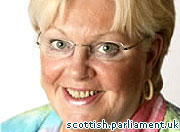Scotland could become a destination for “death tourism” if a highly controversial bid to legalise assisted suicide becomes law, according to palliative care nurses.
The End of Life Assistance (Scotland) Bill, proposed by Margo MacDonald MSP, would allow the terminally ill and people who are “permanently physically incapacitated” to seek assistance in ending their lives.
Elaine Stevens, from the Independent Association of Nurses in Palliative Care, said: “Does Scotland really want to be recognised as a ‘death tourism’ destination?”
Warned
And she warned that people would register with doctors who took part in the scheme, even if they didn’t live in the area.
The stark warning was delivered earlier this week to the Holyrood committee responsible for examining the Bill which has been plagued by controversy.
The committee also heard evidence from hospice chiefs and politicians.
Vulnerable
Dr Chris Sugden, medical director of the St Andrews Hospice in Lanarkshire, cautioned: “The bill appears to have been created for the few at the expense of the many: the many frail, vulnerable patients that we care for across a broad spectrum of age who are in danger of viewing the medical profession with fear and suspicion.”
His concerns were echoed by Maria McGill, chief executive of the Highland Hospice, who said: “We stand resolutely against assisted dying which, contrary to the assertions of the bill, is at variance with the principles and practice of palliative care”.
And Labour MSP Helen Eadie cautioned that the Bill could lead to the development of medics who specialise in assisted suicide.
Illegal
But Margo MacDonald defended her proposal, saying: “Scotland has an enviable reputation for providing a very high standard of palliative care.
“Ultimately, it needs to be recognised that physician-assisted suicide should form an extension of our current system of palliative care.”
Assisted suicide is currently illegal in Scotland and anyone involved in assisting suicide may be charged with culpable homicide.
Opposed
In June a Holyrood consultation revealed that many Scots remain steadfastly opposed to it.
The consultation revealed that 86 per cent of respondents, some 601 people and organisations, were opposed to the Bill.
And in April, 16 palliative care specialists attacked the Bill in an open letter to The Times newspaper.
Value
In the letter the medics warned that the Bill “sends a message to all disabled people and terminally ill patients that somehow because they are dependent on others they are of less value to our society and so may feel that they ought to choose to bring forward the time of their death.”
The medics also cautioned that “the proposed Bill may put pressure on some vulnerable people to make a choice they do not wish to make.”


